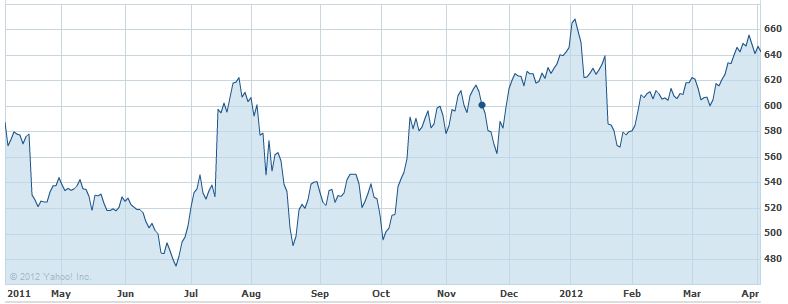Larry Page's one-year anniversary as Google CEO

When Larry Page took over as Google CEO one year ago today, many wondered if Eric Schmidt's seasoned leadership would be missed. Many stockholders were among them, as were many employees. Stockholders, it appears, needn't have worried, at least in the short term. The stock hasn't exactly tanked since last year at this time:
That being said, some employees have felt the shift and been fairly public about their displeasure. James Whittaker, who recently left Google for Microsoft, didn't pull any punches:
Under Eric Schmidt ads were always in the background. Google was run like an innovation factory, empowering employees to be entrepreneurial through founder’s awards, peer bonuses and 20% time. Our advertising revenue gave us the headroom to think, innovate and create...
But...it turns out that there was one place where the Google innovation machine faltered and that one place mattered a lot: competing with Facebook...Google could still put ads in front of more people than Facebook, but Facebook knows so much more about those people. Advertisers and publishers cherish this kind of personal information, so much so that they are willing to put the Facebook brand before their own...
Larry Page himself assumed command to right this wrong. Social became state-owned, a corporate mandate called Google+. It was an ominous name invoking the feeling that Google alone wasn’t enough. Search had to be social. Android had to be social. You Tube, once joyous in their independence, had to be … well, you get the point...The days of old Google hiring smart people and empowering them to invent the future was gone...Employees had gotten it wrong and corporate intervention would set it right again.
So, for all of its social stumbles, for its steadily climbing market cap, for its privacy challenges, for its continued dominance in search, is Google better for Larry Page being at the helm?
BusinessWeek published an interview with Page today that makes it clear that at least Larry thinks the company is headed in the right direction. Not surprisingly, he called out Google+:
I think we have done really well. There are bets that we made many, many years ago—on Android, on Chrome, on YouTube. Those were long-term bets that we made and they’ve been very successful...We made a more recent one, obviously, which is Google Plus, and that’s a long-term bet as well. We’re not even a year into that and that’s going very well, much better than I expected. There are various worries people have, and we’ll address those, but we have a really good start.
I have over 2 million followers now on Google Plus. A number of other people are even ahead of me. And that’s with real engagement. So I’m very happy with the growth of the core Google Plus network.
In fact, more than a few pundits (myself included) agree that Google+ is a powerful network with far more potential than Wave, Buzz, or Orkut ever had. It's different than Facebook and that's OK. The last thing we all need is another Facebook. However, the question remains whether Google can monetize Google+ in the same way that Facebook has been able to monetize their social graph. Perhaps they don't need to if enough people buy into the rest of the Google ecosystem.
This ecosystem, and the increased, more transparent mining (err, I mean, "sharing") of information among its components certainly caused its share of consternation when it was announced under Page's leadership. And yet, for all the controversy (it landed me a spot on NPR), people keep buying Android phones, signing up for Google Apps, and Googling away. And Google is now in a better position to monetize its ecosystem, again under Pages's leadership.
And then there's the Motorola factor. It isn't entirely clear how the acquisition of Motorola Mobility will change the competitive landscape of Android, smartphones, and tablets, but this was hardly one of Google's frequent small buyouts for the sake of technology or brainpower. This is an aggressive foray into new territory for Google, but it remains to be seen how this will play out. Again, as Page explains in the BusinessWeek piece,
It’s pretty hard for me to say much more about that than I have previously, which is just we’re really excited for the opportunity to arrive. What we see, having these amazing devices in your pocket. Every time I get a new one, it’s like a kid on Christmas. I mean, it’s just totally—my life has changed. It’s kind of like the experience of first using the Internet or using a computer as you get these new phones.
What that means in terms of strategy is anyone's guess.
Farhad Manjoo summarized it nicely over on Slate,
By every measure, Google is now a bolder, more disciplined, more ferocious combatant in the Valley’s tech wars.
Is Page's laser focus on social misguided? No...no it isn't. Social is defining all aspects of technology in this decade. Did Page kill privacy and turn Google evil? No...no he didn't. Privacy was already dead. Caveat emptor, folks, even if what you're buying is free. Get used to it. And take a closer look at Facebook and Apple before throwing Google under the bus. Can Google take on Apple with the Motorola acquisition? Yes...yes they can, especially if they leverage a serious hardware play to solve the Android fragmentation issue under control.
All things considered, it's been a year of brilliant successes for Google. Page is quick to point out that their biggest successes have been long-term efforts and therefore can't be attributed to his new role in the last twelve months. However, it appears that the leadership change at Google was the right move at the right time, disgruntled employees notwithstanding.
